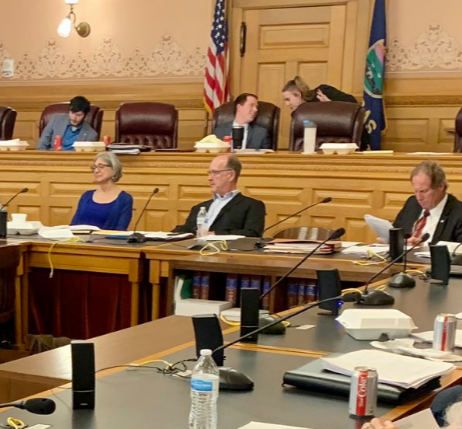
By JOHN HANNA
TOPEKA, Kan. (AP) — Republican lawmakers in Kansas pushed Wednesday to greatly limit Democratic Gov. Laura Kelly’s power to keep businesses closed during the coronavirus pandemic and give the GOP-controlled Legislature’s leaders the final say over how federal coronavirus relief funds are spent.
GOP members of the Senate Judiciary Committee included the measures in a bill that the full Senate expects to consider Thursday, when the Legislature is scheduled for one, final day in session this year. Republicans tied their proposals to two must-have measures for Kelly — a formal ratification of Kelly’s previous coronavirus orders and an extension of state of emergency that she declared so that she could legally exercise broad powers.
A dispute between the Democratic governor and Republican legislative leaders has grown increasingly bitter over who controls the reopening of the state’s economy and the spending of coronavirus aid. Many GOP lawmakers contend Kelly is moving too slowly to reopen on the economy and dislike that her plan for lifting restrictions in phases between now and late June treats different kinds of businesses differently.
Republicans’ proposal would allow Kelly to close businesses only for a total of 15 days during the pandemic. After those 15 days, the health officers in each of the state’s 105 counties would decide whether businesses remained closed, subject to the approval of local county commissions. Because many Kansas businesses already have been shuttered longer than 15 days, it wasn’t immediately clear whether county officials could step immediately if the measure becomes law.
“One size doesn’t fit all,” said state Sen. Eric Rucker, a conservative Topeka Republican who drafted the language on business closings. “The overarching cry that we hear is the long-lasting — possibly lasting decades into the future — damage that has been caused economically.”
The bill cleared the Judiciary Committee on an 8-2 party-line vote, with only Republicans voting yes.
Kansas Republicans acted on the same day Kelly and GOP Gov. Asa Hutchinson of Arkansas met with President Donald Trump, who said both had “done a fantastic job.”
Kelly joins Democratic governors in other states, most notably Michigan, Pennsylvania and Wisconsin, in facing a backlash from Republican legislators over their actions to control the spread of the novel coronavirus.
Sen. David Haley, a Kansas City Democrat, said he’s concerned about limiting the governor’s to impose statewide restrictions because someone could travel between counties and “become a carrier.”
“This virus does not respect geo-political boundaries,” Haley said.
Kelly’s existing state of emergency will remain in place only through Monday, Memorial Day. Kelly has acknowledged that she may be forced to accept limits on her power to get lawmakers to extend the state of emergency — or watch her 30 coronavirus-related orders expire. Her top lawyer and legislators concede it’s an open question whether Kelly has the authority to keep issuing new declarations for the same emergency.
The bill also would give the Legislature’s top seven leaders, five of them Republicans, the final say over how $1.25 billion in coronavirus relief funds are spent after a review by a joint House-Senate budget committee.
Kelly appointed a 20-member task force to oversee the distribution of the money and help her manage the reopening of the state’s economy, and five legislators are members, including three Republicans. She and other Democrats argue that the task force will provide adequate oversight.
And Republican Sen. Randall Hardy of Salina worried that an extra layer of oversight could unnecessarily delay much-needed funds to cities and counties to cover their coronavirus costs.
But many GOP lawmakers argue that the Legislature has the duty to oversee how the aid is spent, just as it approves an annual state budget.
Without legislative oversight, the governor could decide how the funds are spent “on her sole authority,” said Senate Majority Leader Jim Denning, a Kansas City-area Republican who is serving on Kelly’s task force.
“It’s just really a safety check,” Denning said of legislative oversight.
___



